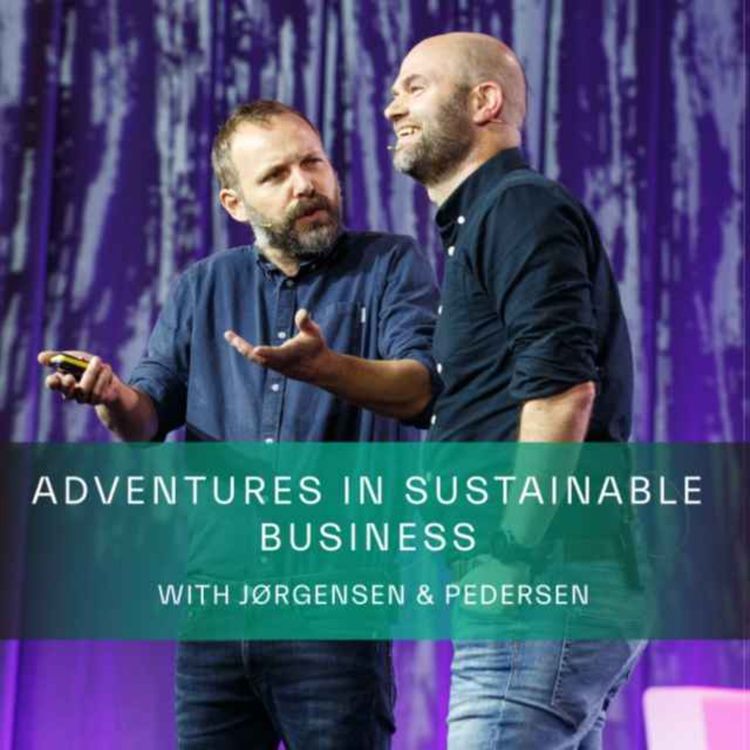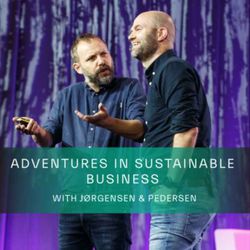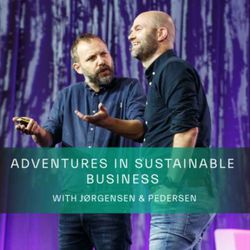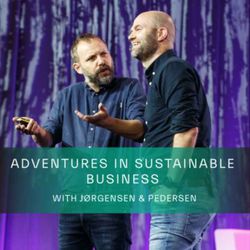Share

Adventures in Sustainable Business
#ASB008: Our new Massive Open Online Course (MOOC) "Business Models for Sustainability" with Kirsti Reitan Andersen
In this episode, we celebrate the great news that our new MOOC (Massive Online Open Course) "Business Models for Sustainability" is finally published on the Coursera platform. This is a great opportunity to everyone to follow a free online course in this topic from some of the best scholars in the field. We talk to Kirsti Reitan Andersen from Copenhagen Business School, who has been the engine in the work with the MOOC, which is joint work in collaboration between NHH (the two of us), CBS (Kirsti, Esben Rahbek Gjerdrum Pedersen and Ana Lucia Diaz Schiavon), ESADE Business School (David Murillo Bonvehi) and ESCP Business School Berlin (Florian Lüdeke-Freund). The MOOC takes about 20 hours and is designed for a 7-week duration. It gives you insight into business models and their externalities, the different dimensions of sustainability, business model innovation, circular business models, different types of sustainable business models, social innovation, sustainable business model ecosystems and more. Enroll now for free on the Coursera platform - and do listen to this chat with Kirsti, where we talk about the nuts and bolts of the MOOC!
More episodes
View all episodes

7. #ASB007: University Students Ask Great Questions about Sustainable Business with Ingeborg Rønning and Hannah Johansson
51:04||Ep. 7In this episode, we do one of our favorite things - talk about sustainable business with students! We are visited by two students from the University of Bergen, Hannah Johansson and Ingeborg Rønning, who in addition to being students, work with coordinating a student-led course on "Sustainable Innovation" at the University of Bergen. We talk about how student-led courses work in practice, the challenges and benefits of interdisciplinary work in sustainable business, and answer questions from the students who are taking the course. How do you know which businesses are actually sustainable? Can sustainability be measured and how? What is the role of collaboration for sustainable business, and how can companies influence governments to make better regulations? And not at least, is a green economy really possible within a capitalist system?
6. #ASB006: Organizing for Sustainability in New Business Models with Niels Faber
42:56||Ep. 6We are joined by Niels Faber, Assistant Professor of Circular Entrepreneurship at the University of Groningen, for a conversation about his new Open Access book (with Jan Jonker), "Organizing for Sustainability: A Guide to Developing New Business Models". We also discuss their new MOOC on the same topic, which his available for free on the edX platform. We discuss the challenge of organizing for sustainability, three stages in business model innovation for sustainability - definition, design and results, and the many ways in which business model innovation happens within and across organizational boundaries. We talk about the role of the dream for innovation, the challenge of identifying and measuring results across more than one performance dimension, and the benefits of publishing and sharing books and other materials open access.
5. #ASB005: Regenerative Leadership with Laura Storm
52:16||Ep. 5We are joined for a chat by Laura Storm whose personal and professional journeys in sustainability are too plentiful to cover in a single podcast episode. She was a sustainability adventurer from her childhood, and after finishing high-school she went to the Ecuadorian part of the Amazon to work as a volunteer in the same area where she had bought a piece of the rainforest when she was only 10 years old. She later initiated and led Sustainia and made it into a global brand, she was an early mover in the circular economy field, and she is a Greenbiz 'Worldchanger' and a World Economic Forum Young Global Leader. Now she has embarked on a journey to mobilize Regenerators and Regenerators Journey, which is a movement for regenerative leadership. We talk about her recent book "Regenerative Leadership: The DNA of life-affirming 21st century organizations" (w/Giles Hutchins), what it means to be a regenerative leader, why leaders need to become ecosystem facilitators and whether Ray Anderson from Interface was a regenerative leader. Our conversation touches on wide-ranging topics like witches, the power of the young, reconnecting with nature and masculinity in leadership. We end by agreeing that we need to chat again soon. Hopefully, in Laura's Copenhagen.
4. #ASB004: The role of the CEO for sustainable business with Georg Wernicke
01:02:30||Ep. 4We are visited by Georg Wernicke, Assistant Professor at HEC Paris, for a chat about his work on the role of CEOs for sustainable business. How important is the CEO for the sustainability performance of companies? Is it the personality of the CEO or the function of the CEO that matters most, and what is the influence of the broader culture and context of the company for the CEO's ability and inclination to promote sustainability in business decisions? Needless to say, we draw many parallels to football. Is replacing a CEO like replacing a star striker? Why is Lars Jacob's Facebook feed full of videos of Diego Maradona and Ronaldinho, and how is that question related to Spotify CEO Daniel Ek's response to the ongoing #deletespotify campaign? We discuss the role of CEO activism on sociopolitical issues, whether older or younger CEOs care more about sustainability, why getting a daughter influences CEO's business decisions and we long for our beloved Paris, where Georg is back in the office, post-corona.
3. #ASB003: Unsustainable and sustainable business models with Nancy Bocken
44:27||Ep. 3Professor Nancy Bocken is a world-leading researcher in the field of sustainable and circular business. Just like us, she combines her academic work with various types of business engagement. In addition to her academic affiliations in Maastricht, and Cambridge, she is also a co-founder of the company HOMIE and the leader of the large research project CircularX. We talk to Nancy about her work on unsustainable business models, the role of experimentation in sustainability innovation, whether ice cream should be considered a necessary product, the root causes of unsustainability in the economy, whether we need a new understanding of the economy à la Kate Raworths Doughnut Economics and why the Netherlands is such a hotspot for circular business.
2. #ASB002: A RESTART for Sustainable Business
52:37||Ep. 2In this episode, we introduce the framework RESTART from our Open Access book "RESTART Sustainable Business Model Innovation". The framework consists of seven interrelated developments at the level of business models, which we believe are important for the transition to more sustainable business. The seven components of the acronym are, respectively, Redesign, Experimentation, Service-logic, The circular economy, Alliances, Results and Threedimensionality. We use the case of the American carpet producer Interface FLOR to illustrate the components of the framework and we draw out the canvas of how to think about more sustainable business models and how they can be achieved. You can download our book for free at Jorgensenpedersen.no or at Palgrave's webpage.
1. #ASB001: Let the adventures begin!
33:03||Ep. 1In the inaugural episode of Adventures in Sustainable Business, we introduce the podcast series. Why adventures? Why sustainable business? Who are we? And what will this all be about? We draw a roadmap for the coming episodes, in which we will explore the many different facets of sustainable business. The companies that try to make it happen. The research that shows us what works and what doesn´t. The people who are trying to make it a reality. The barriers that stand in the way. And so on. Let the adventures begin!